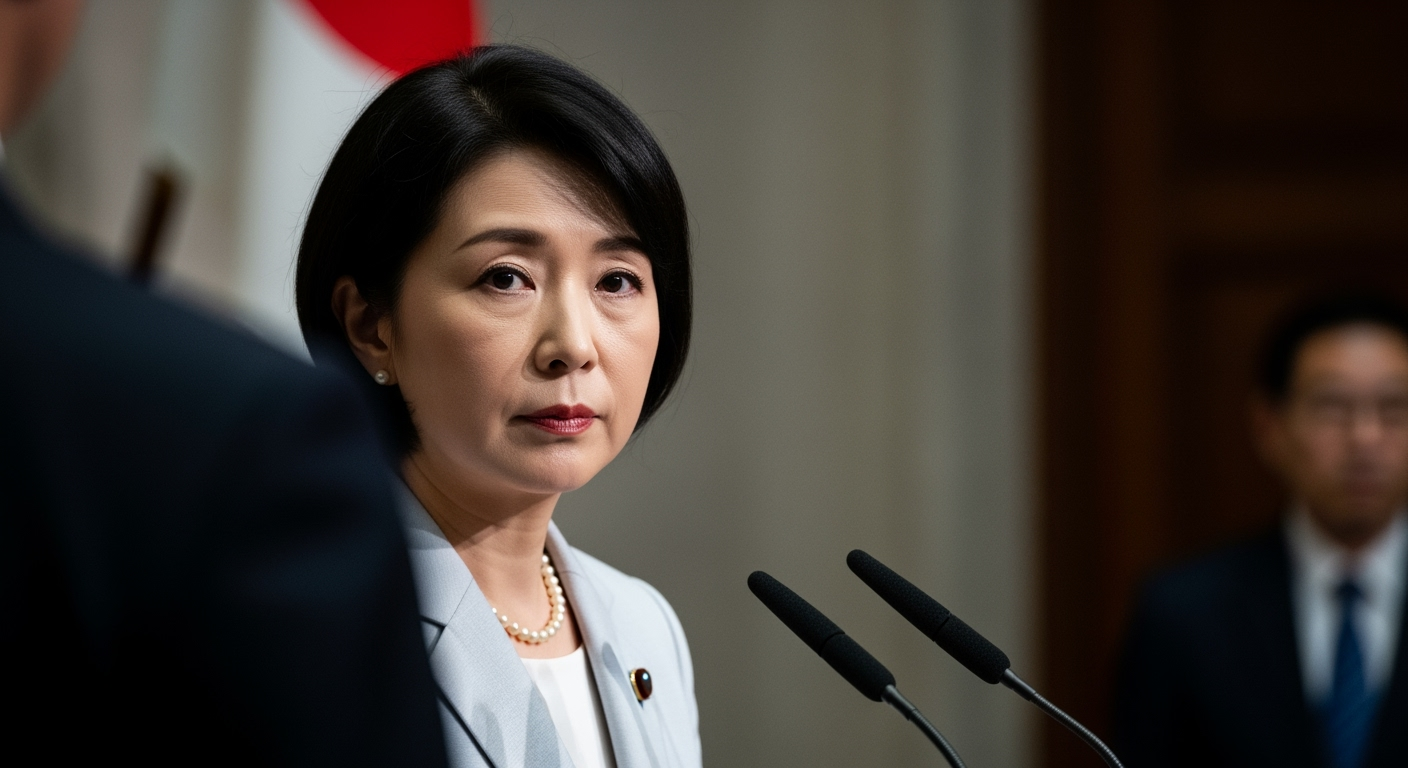Related Articles

Virginia Giuffre's Posthumous Memoir Intensifies Pressure on Prince Andrew and British Monarchy

Diplomatic Tightrope: Vance in Israel as Gaza Truce Teeters on the Brink





TOKYO – In a landmark development reverberating across Japan and the international stage, Sanae Takaichi was formally elected as the nation’s first female Prime Minister by the National Diet on October 21, 2025. The historic confirmation follows weeks of intense political maneuvering and coalition negotiations, marking a pivotal moment for a country long characterized by its male-dominated political landscape. Takaichi, a 64-year-old ultraconservative and a veteran politician, takes the helm at a critical juncture, inheriting an economy grappling with rising prices and a fragmented political environment. Her ascension to power ushers in a new era for Japanese leadership, breaking a significant barrier in a society striving for greater gender equality while simultaneously signaling a potential shift towards more hawkish policy stances.
Sanae Takaichi's journey to the pinnacle of Japanese politics culminates a decades-long career distinguished by her unwavering conservative principles and a persistent pursuit of the nation's highest office. Her election as Prime Minister came after securing a majority of 237 votes in the Lower House during a parliamentary vote on October 21. This parliamentary confirmation was largely assured following her decisive victory in the Liberal Democratic Party's (LDP) presidential election on October 4, where she defeated Agricultural Minister Shinjiro Koizumi in a runoff. This win marked her third bid for the LDP leadership, having previously fallen short in 2021 and 2024, the latter against former Prime Minister Shigeru Ishiba.
Takaichi's path to premiership was expedited by the resignation of Prime Minister Shigeru Ishiba, who stepped down after the LDP suffered significant electoral losses in July 2025, leading to a three-month political vacuum. Ishiba's cabinet resigned earlier on the day of Takaichi's election, paving the way for her succession. Her persistence through multiple leadership contests ultimately positioned her to capitalize on the LDP's need for a new leader to navigate the complex political fallout from the July elections.
The LDP's electoral setbacks in July 2025, which saw it lose its majority in both houses of parliament, forced Takaichi into a delicate dance of coalition building. A major challenge arose with the unexpected dissolution of the LDP's long-standing 26-year coalition with the centrist Komeito party. Komeito's departure was reportedly driven by concerns over Takaichi's ultraconservative political views and the LDP's perceived lax response to corruption scandals that had plagued the party. This rupture left the LDP in a minority position and threatened its ability to govern effectively.
In a critical move that secured her premiership, Takaichi forged a new coalition with the right-wing Japan Innovation Party (JIP), also known as Ishin no Kai. The agreement was solidified on October 20, just a day before the parliamentary vote. This new alliance, characterized by shared hawkish stances on national security and a more conservative ideological alignment, ensured Takaichi had the necessary votes to be elected Prime Minister. However, the LDP-JIP coalition remains a minority in both parliamentary chambers, signaling that Takaichi's government will need to court support from other opposition groups to pass legislation. This precarious parliamentary arithmetic highlights the delicate balance she must maintain to ensure political stability, a point she emphasized during the coalition signing, stating, "Political stability is essential right now. Without stability, we cannot push measures for a strong economy or diplomacy.”
Sanae Takaichi steps into the Prime Minister's office with a well-defined and consistently conservative political ideology. Often described as an "ultraconservative" and a "nationalist," she has frequently drawn comparisons to former British Prime Minister Margaret Thatcher, even adopting some of her sartorial style. As a protégé of the late Shinzo Abe, Takaichi is widely expected to continue his legacy of assertive economic and security policies.
Her policy platform reflects her conservative leanings. On foreign policy, she is known for her hawkish views on defense and her critical stance toward China. Her regular visits to the controversial Yasukuni Shrine, which honors Japan's war dead including convicted war criminals, have historically been a point of contention with neighboring countries like China and South Korea. Domestically, Takaichi's social views are equally conservative; she supports the imperial family's male-only succession and opposes same-sex marriage and allowing married couples to retain separate surnames. These positions often place her at odds with calls for greater gender equality in Japan, despite her groundbreaking achievement as the first female Prime Minister. Economically, Takaichi faces the immediate task of addressing rising inflation and stimulating the economy, with plans to compile an economic stimulus package funded by a supplementary budget.
Sanae Takaichi's election as Japan's first female Prime Minister is undoubtedly a monumental achievement, shattering the "ultimate glass ceiling" in a deeply patriarchal society where women remain underrepresented in politics. Her rise is a testament to her political resilience and marks a significant step forward for female representation in a nation that ranks low on global gender equality indices.
However, her premiership begins with formidable challenges. On the international front, she faces immediate diplomatic engagements, including talks with U.S. President Donald Trump and attendance at regional summits, requiring her to quickly establish her presence on the global stage. Domestically, her minority government's reliance on coalition partners, particularly the JIP, means she will need to skillfully navigate parliamentary dynamics to pass crucial legislation. The task of regaining public trust, which has eroded due to economic concerns and past scandals, will also be paramount. With Japan's history of relatively short-lived prime ministerial tenures, Takaichi's ability to maintain political stability, unite her party, and effectively address pressing national issues will determine the longevity and legacy of her historic leadership.